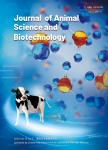Dietary supplementation with free methionine or methionine dipeptide mitigates intestinal oxidative stress induced by Eimeria spp. challenge in broiler chickens
Dietary supplementation with free methionine or methionine dipeptide mitigates intestinal oxidative stress induced by Eimeria spp. challenge in broiler chickens作者机构:Animal Science DepartmentState University of MaringáColombo Avenue5790Jardim UniversitárioMaringáParaná87020-900Brazil Animal Science DepartmentFederal University of SergipeMarechal Rondon AvenueS/NJardim Rosa ElzeSao CristóvaoSergipe 49100-000Brazil EVONIK of BrazilArquiteto Olavo Redig de Campos Street105Tower ASo PauloSP 04711-904Brazil Physiology DepartamentFederal University of SergipeMarechal Rondon AvenueS/NJardim Rosa ElzeSao CristóvaoSergipe 49100-000Brazil
出 版 物:《Journal of Animal Science and Biotechnology》 (畜牧与生物技术杂志(英文版))
年 卷 期:2019年第10卷第4期
页 面:1005-1021页
核心收录:
学科分类:090603[农学-临床兽医学] 09[农学] 0906[农学-兽医学]
基 金:funded by the National Council of Technological and Scientific Development(CNPq) Brazil(Project no.445322/2014–4)
主 题:Antioxidant Coccidiosis Gut INFG PEPT1
摘 要:Background: This study evaluated the effects of Eimeria spp. challenge and dietary supplementation with free methionine or methionine dipeptide on animal performance;expression of genes associated with the immune system, antioxidant system, and amino acid transport in the jejunum;and redox status of the jejunum of broiler ***: A randomized, 2 × 3 factorial design was used, in which Eimeria spp. challenge was the first factor(Eimeria-challenged, EC, or unchallenged, UC, broilers) and methionine supplementation was the second factor(non-supplemented, NS;free DL-methionine, DL-Met;and methionine dipeptide, DL-methionyl-DL-methionine, DLMMet). At 14 days of age, chickens were inoculated orally with sporulated oocysts of Eimeria acervulina, Eimeria praecox, Eimeria maxima, and Eimeria mitis. Birds were killed by cervical dislocation 144 h post-inoculation(PI), and the jejunum was collected for biochemical and molecular ***: EC broilers had a 13% lower feed intake(FI), 37% lower body weight gain(BWG), and 39% higher feed conversion ratio(FCR) than UC broilers. Chickens fed the DL-Met diet had higher BWG(about 12% higher) and better FCR(about 12% lower) than chickens fed the NS diet. EC chickens had lower relative weight of the bursa of Fabricius(51.8%) and higher relative weights of the spleen and whole intestine(53.6% and 26.3%, respectively) than UC chickens. Eimeria spp. challenge led to an increase in the levels of oxidative substances, such as nitrite and thiobarbituric acid reactive substances(TBARS), in the jejunum of chickens 144 h PI. Among UC chickens, those fed the DL-Met diet had higher total antioxidant capacity(TAC) and lower catalase(CAT) and superoxide dismutase(SOD) activities. EC chickens that received the NS diet had higher carbonylated protein content(CP). This result was associated with their lower TAC and catalase activity. The lower TAC in EC chickens might have been due to reduced expression of catalase(CAT) and superoxide



